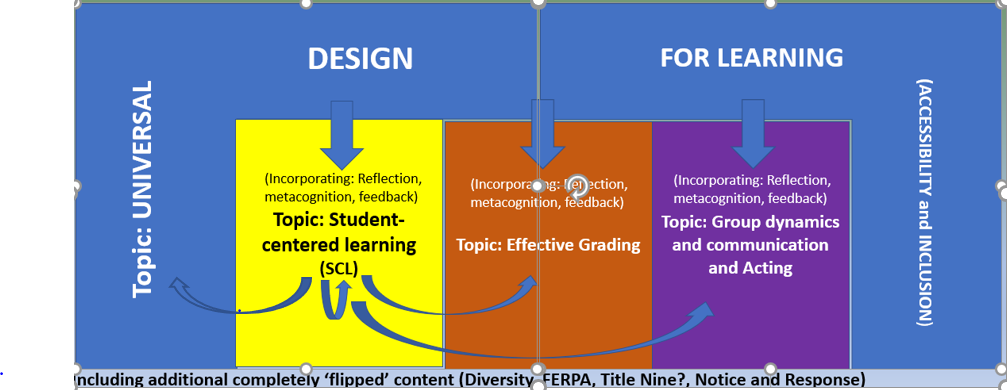Overview of ELI TA Development Program
Brief overview of Engineering Learning Initiatives (ELI) Teaching Assistant Development Program (TADP)
- All PhD TAs in the Engineering College are required to complete ELI training. (Exception: They are encouraged, but not required, if they have attended the CTI trainings for International TAs).
- ELI staff work with experienced engineering graduate student TAs (TA consultants) to continually develop interactive workshops that emphasize and model current best practices.
- Training events for PhD TAs, and for Masters/Undergraduate TAs, are delivered at the outset of the Fall and Spring semesters.
Training Components
Breakout session topics:
- Universal Design for learning (UDL)*
- Active and Student-centered Learning
- Group Dynamics and Communication*
- Fair and Effective Grading
All sessions emphasize and model inclusive and equitable teaching practices for diverse learners.
(*In M/UG training, UDL workshop is replaced by an experienced TA panel, and Group dynamics workshop is altered to focus on helping students develop questioning strategies to encourage thought.)
PhD TA training includes a 2-hour microteaching session in which TAs are video-recorded as they facilitate a 5-minute lesson, followed by self-reflection and peer feedback. Microteaching sessions are scheduled in the 2-week period following the main training event.
PhD TAs interested in gaining more expertise and reflecting on their teaching practice are encouraged to enroll in an independent study, one-credit course—Teaching Seminar/Engineering—ENGRG 6780, facilitated by the Associate Director of Engineering Learning Initiatives, Dr. Celia Evans.
Objectives of TA training workshops
After completing ELI TA training, TAs will be able to:
- Identify principles of universal design for learning (UDL) and explain how they can be used in the preparation of an inclusive environment for a diverse group of learners in all teaching responsibilities - office hours, recitations, labs, and student interactions - in face to face and online learning environments.
- Select active-learning strategies that are best suited for supporting stated objective outcomes (based on the principles of ‘backward design’ in education planning) in face-to-face and in online learning environments.
- List and describe characteristics of good inclusive communication practices for use with diverse students in groups and one-on-one, both verbally and electronically (internet, email, and discussion boards).
- Describe key grading strategies, and identify critical components of rubrics, that keep grading practices unbiased and effective in both face-to-face and online environments.
- Identify and explain the value of, and tools for, using additional evidence-based teaching practices (specifically reflection, metacognition, and feedback) to improve learning outcomes in face-to-face and online environments.
- Articulate an increased level of confidence in their ability to facilitate learning for all students in in-person courses and in online teaching environments.
- Recognize and initiate appropriate action in TA-specific situations related to students in distress and other University policies (Title IX, Consensual Relationships, FERPA, Academic Integrity, ADA compliance).
Schematic of ELI TA Development workshop structure

New TA Midterm Evaluation questions
Our revised TA midterm evaluations questions now more closely align with training goals, and more specifically address tools and strategies TAs use. These should yield more actionable student feedback, for improving both TA practice and training program development. Some questions were retained from the previous set of questions for consistency through time – for example ‘Overall I would rate my TA as…’
Updated TA Midterm Evaluation Questions |
1) My TA is approachable and responsive to individual requests for various types of support (e.g., sharing resources for academic or personal help) 2) My TA provides creative and varied ways to introduce information and assess my understanding when they can (when not determined by the instructor) 3) My TA provides feedback/rubrics on assignments, quizzes, and/or exams 4) My TA creates flexibility and variety in activities and assignments when they can (when not determined by the lead instructor) 5) My TA Incorporates active learning techniques (e.g., polling, think-pair-share, reflection opportunities) 6) My TA encourages me to ask questions and to express my opinions 7) My TA provides opportunities for students to work collaboratively with one another 8) My TA appears to be fair and unbiased when grading my assignments 9) My TA actively maintains a welcoming and inclusive learning environment for students of all identities and backgrounds (e.g., learns names; uses inclusive language and examples; encourages questions, feedback, and discussion from all) 10) My TA asks questions that help me think about a problem and work towards a solution 11) My TA communicates course material in a way that I can understand it (i.e. by giving clear and comprehensive explanations and using relevant examples) 12) My TA contributes positively towards my learning experience in this course 13) Overall, I would rate my TA as (on a scale from 1-5 (1 being poor, 5 being great)) |

